December 5th, 2024Fresh eyes on Palestine
Reflections from a Solidarity Pilgrimage
Fresh eyes on Palestine—reflections from a solidarity pilgrimage
Five of us from the Mennonite Church Canada PIN recently returned from the “solidarity pilgrimage” led by the Sabeel Ecumenical Liberation Theology Centre in occupied East Jerusalem in November. As part of our commitment to ongoing advocacy, we each have written a brief reflection on something that stood out for us. We will be sharing much more in various venues in the coming days and weeks. 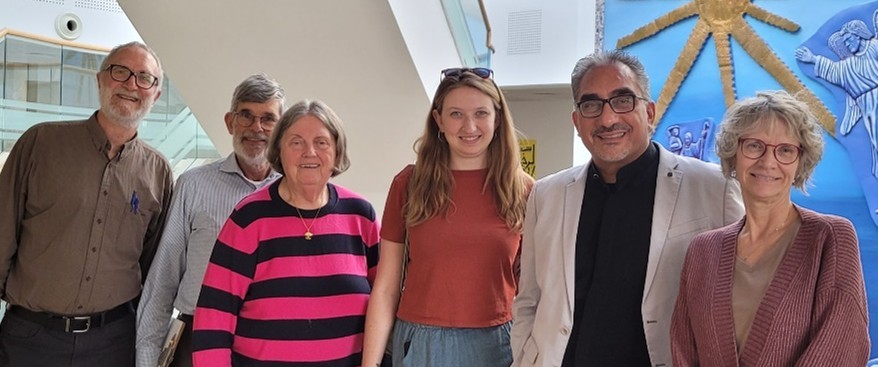
We were part of a larger group from the US, the UK, and Canada, all related through the “Friends of Sabeel” networks. We are pictured here on a visit with Rev. Jack Sara of MC Canada’s partner Bethlehem Bible College. (Left to right: Byron Rempel-Burkholder, Dan Epp-Tiessen, Kathy Bergen, Chloe Bergen, Jack Sara and Jo Hiebert Bergen.
For context: the Sabeel Centre had planned to host an international conference on religious extremism. However, amid the Gaza war and threats of escalation, and with government travel advisories in place, registrations were only a trickle. Rather than cancel, the Centre refashioned the conference as “solidarity pilgrimage” instead. Over 50 participants came in the end.
The pilgrimage included visits with church leaders, peace and human rights advocates, and other Palestinians and Jews in East Jerusalem, Israel, and the West Bank communities of Bethlehem, Hebron, Ramallah and Nablus. The PIN delegation also took time after the pilgrimage to visit others they have known over the years. All our hosts had been deeply and personally affected by the war occurring just an hour’s drive southwest of Jerusalem. Many had relatives or friends killed in Israel’s bombardments of Gaza. All were uncertain and fearful of the future of their land. At the same time, their dark sense of humour and their steadfast commitment to a different world was uplifting. The following provide just some impressions, meant to be read alongside the PIN Advent resource “Bethlehem Then and Now”.
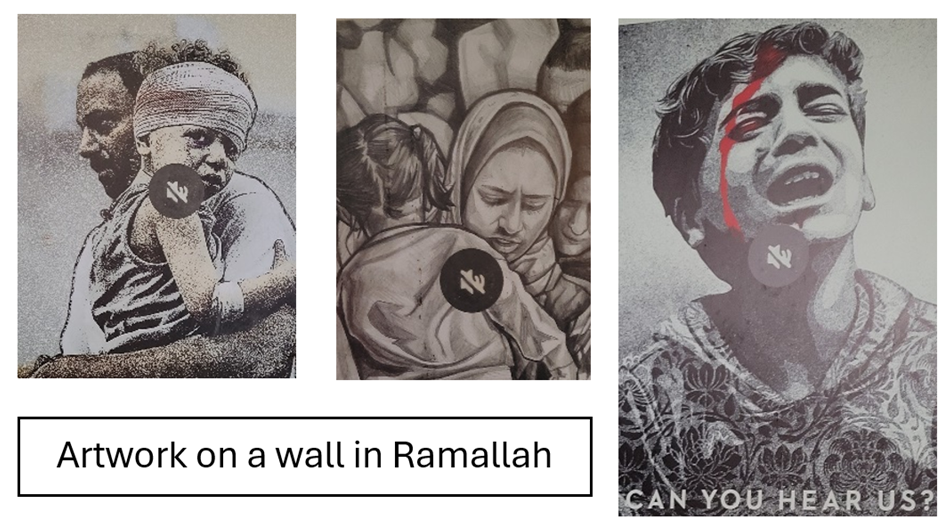
Our reflections follow:
Jo Hiebert Bergen: King Herod and the Children of Palestine
Herod, occupier of the Roman Empire, complicit in the marginalization of his own people as a ruler with Jewish roots, lived with enough fear that even children posed a threat.
As part of our solidarity pilgrimage, we stood on a hill in Sderot, Israel, at a USA-funded ‘look out’ with a view to the northern Gaza border (see photos). Smoke was visible. It rose and drifted.
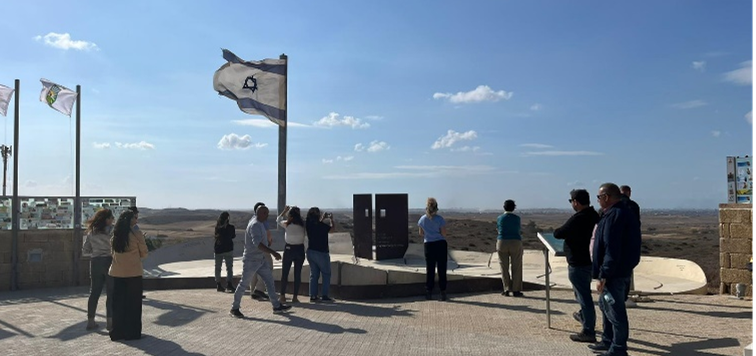
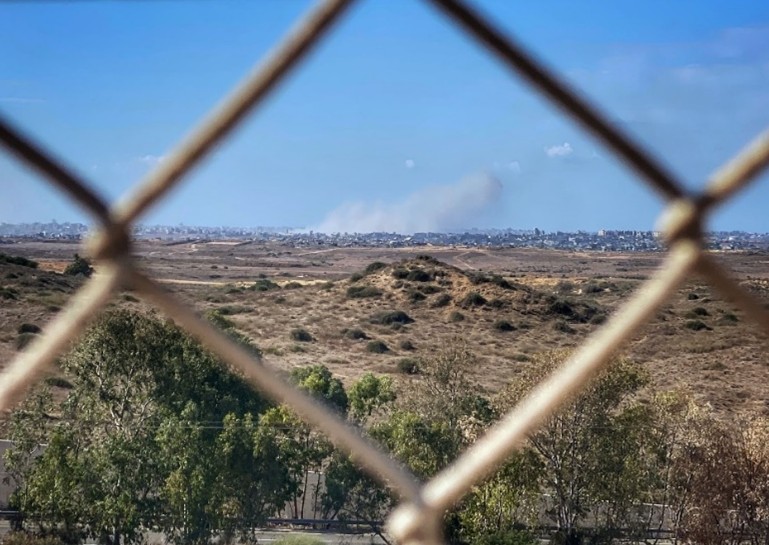
Gaza’s north is a focus of Israel’s massive operation to cleanse it of Palestinians. Starvation, bombardment, destruction of newly constructed tent cities of refuge, hospitals, UN schools -- no space is sacred. Sixty percent of Gaza’s population are children.
Within besieged Gaza, as terror rains down and necessities of life are denied, I know one family who cannot even find shoes to fit the growing feet of a 3-year-old and a 5–year-old. Little food or water, the cold of December--and no shoes for the children of Gaza as the cold and rain of winter sets in.
The lookout we climbed—created for Israelis eager to watch the destruction of Gaza--became our hill of lament. We also remembered that Herod’s aim to eliminate threat at its root by laying it at the feet of children, failed. Jesus, the baby grew into our Peace Presence, providing us with an alternative to fear and destruction.
Chloe Bergen: The sumud of showing up
As we prepare to celebrate the birth of Jesus and imagine what his childhood may have been like, I think of the many children in Bethlehem and the surrounding areas who cannot receive the care they need.
I was honored to join some of my Mennonite Church Canada PIN colleagues on a solidarity pilgrimage of the West Bank. While there, I reconnected with Caritas Baby hospital where I did a practicum placement in the spring of 2023. As the only hospital in the West Bank with the sole focus on pediatrics, families travel from all over the West Bank to receive care for their children.
Today, my former colleagues informed me that less than half the number of out-patients can come for treatment. Either restricted in their movement across Israeli checkpoints in the West Bank, or restricted by their financial situation made worse by the apartheid system, children are barred from receiving the care they need for optimal growth and functional ability.
Yet, while I am repeatedly reminded by my friends about the fear and uncertainty they face as the situation in the West Bank grows more and more dire, I am reminded of the steadfastness or Samoud of my colleagues as they return to work day after day to provide essential services for any child who manages to pass through the increasing number of checkpoints and make it safely to the hospital.
This year, as we gather with our families and the children who populate them, let us think of those in Palestine who are restricted from receiving the basic medical care they require and the many health care providers who do whatever they can to help."
Dan Epp-Tiessen: Who Has Access?
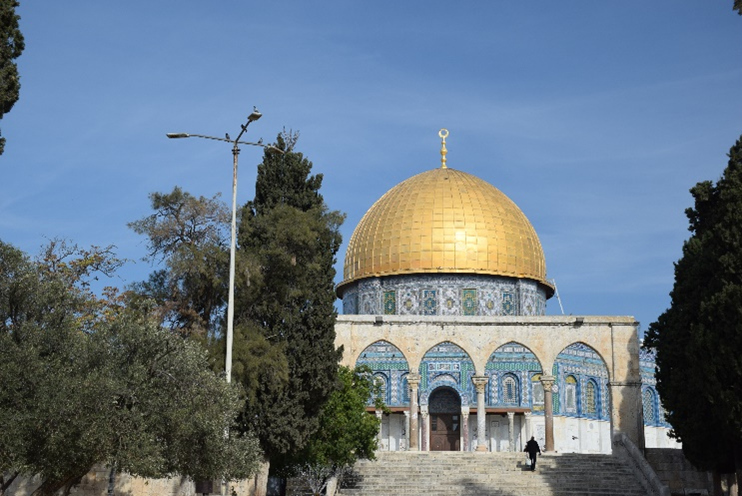 A personal highlight of mine was a tour of the Al Aqsa Mosque complex. The Haram Al-Shareef, as it is called by Muslims, commemorates the place from which Mohammed ascended into heaven, making it the third most holy site in Islam.
A personal highlight of mine was a tour of the Al Aqsa Mosque complex. The Haram Al-Shareef, as it is called by Muslims, commemorates the place from which Mohammed ascended into heaven, making it the third most holy site in Islam.
The complex includes the famous golden Dome of the Rock and its colourful mosaics, and the less decorative yet impressive Al Aqsa Mosque. Our Muslim guide warmly welcomed our Christian group, highlighting important biblical figures who are also venerated in Islam. He invited us to take pictures of anything except himself and people worshipping. He asked us not to use his name in anything we write, because the Israeli military has arrested him several times, and once they broke his arm.
To enter the compound, we had to show our passports to Israeli machine-gun-toting guards. Inside, Israeli security cameras monitored our every step, and heavily armed soldiers in groups of four patrolled constantly.
Our guide lamented how the once-lively site is now almost bereft of people, because Israel severely restricts Palestinian access. I was stunned by the irony. As a foreigner and a Christian, I had little difficulty accessing this beautiful and amazing Muslim holy place, yet most Palestinian Muslims living around and nearby, are often prevented to visit this shrine that is so important to their faith.
We saw a badly damaged side door leading into the mosque, which the Israeli military had battered down two years ago when raiding the mosque.  The door remains in shambles because Israel refuses permission to repair it. Our guide also told us that for six years he has been trying unsuccessfully to obtain an Israeli permit to repaint his office.
The door remains in shambles because Israel refuses permission to repair it. Our guide also told us that for six years he has been trying unsuccessfully to obtain an Israeli permit to repaint his office.
What I witnessed is a microcosm of life for Palestinians living under Israeli control, restriction, surveillance, humiliation, bullying, and even attempts to “erase” Palestinian presence. Israelis and many tour groups call the complex “The Temple Mount,” because the Jewish temple once stood there before the Romans destroyed it in 70 CE. The expression “Temple Mount” is a rhetorical “erasure” of Palestinian and Muslim presence in and claims to the space in favour of Jewish claims and presence. The expression implies that the centuries-old Muslim shrine is an illegitimate intruder on space that belongs exclusively to Israeli Jews. I can only shudder at what ugly forces such rhetoric might yet unleash.
Byron Rempel-Burkholder: “The Olive Tree is family”
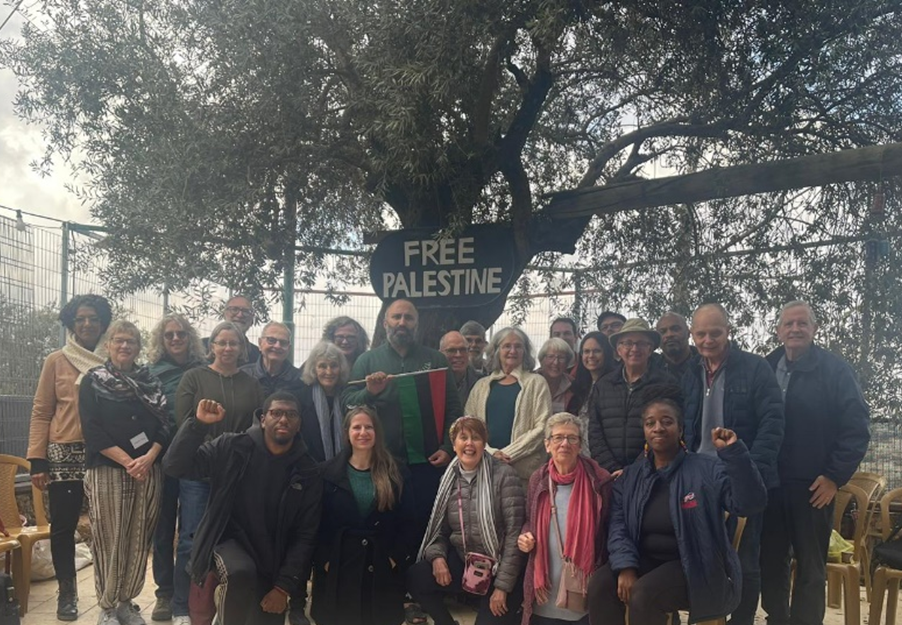 On our pilgrimage some of us visited Issa Amro, a champion of nonviolent Palestinian resistance (in the photo, holding the flag, under a mature olive tree in his yard). His house and yard in Hebron, southern West Bank, are wedged between his olive grove and an illegal Israeli settlement abutting his house. Days before our visit, settlers had come in the middle of the night and picked his olives. In the past they have damaged or uprooted trees while the Israeli security forces turned a blind eye.
On our pilgrimage some of us visited Issa Amro, a champion of nonviolent Palestinian resistance (in the photo, holding the flag, under a mature olive tree in his yard). His house and yard in Hebron, southern West Bank, are wedged between his olive grove and an illegal Israeli settlement abutting his house. Days before our visit, settlers had come in the middle of the night and picked his olives. In the past they have damaged or uprooted trees while the Israeli security forces turned a blind eye.
“These trees are our family” Issa told us—and it suddenly hit me: Our Indigenous neighbours in Turtle Island use similar language when they refer to the forests and all creation as “our relations.” By contrast, my own settler people tend to see trees and natural resources as commodities to be taken and controlled.
A few days later, when a few of us visited Bethlehem Bible College, I chatted with H., the librarian, whom I knew from a previous visit. Knowing that her family had difficulty accessing olive trees on land they own on the other side of the separation barrier (they need permits from Israel, arbitrarily granted), I asked how the harvest had been this year. She said they lost their whole harvest (and not for the first time.) This time, the family had permits, but they expired before the olives were ripe. If anyone harvested them, it was Israelis from the settlements overlooking the family orchard. We learned that this year Palestine had a bumper crop in olives, but because of the lateness induced by climate change, coupled with the increased restrictions on movement during the war, about half of it was lost, adding to the economic nosedive the Gaza war has visited on the people.
Kathy Bergen: In Palestine five years later
Of the five Mennonite Church Canada participants, Kathy Bergen was our veteran authority, having first worked in Palestine with MCC in the early 1980s, and in other advocacy capacities ever since, in Palestine, Europe, the US and in retirement, Canada.
My last visit to Palestine was in late 2019 when I attended the Sabeel International Meeting in November 2019 and afterwards co-led a group after the Sabeel Meeting “Come and See: Go Tell and Do”.
The changes in the five years since have been huge. There is a new road system that Israel has developed around East Jerusalem and into the West Bank that is geared to facilitate the travel of settlers West Bank and East Jerusalem into West Jerusalem and other points in Israel. The light rail system in Jerusalem is also being expanded for the same purpose. The settlements have grown, and many new ones have been established.
The suffering of Palestinians has increased. More homes are being destroyed and Israeli prisons are fuller than ever with Palestinians, including administrative detainees. Torture of Palestinians in Israeli prisons, which has always been part of the Israeli prison system in this last year has reached its limits of vulgarity. The decimated economy of the West Bank, including East Jerusalem, is affecting every Palestinian.
Especially in Gaza, but throughout the West Bank, every Palestinian is facing uncertainly, which was difficult and very scary for me to hear. If Israel annexes parts of the West Bank, Palestinians will be left in the large cities in Arab Bantustans without land and without ways to earn a living. Some fear that that they may require permission from the Israeli military to travel from city to another.
We did not visit Palestinians living in Israel, but from conversations I have had with friends, they are also suffering terribly economically. They face daily harassment and imprisonment as second-class “citizens” of Israel.
The overall picture for Palestinians is unpredictable and frightening, yet Samuud (steadfast determination) persists. For me, I left with anger for what is happening and resolve to do what I can back in Canada to promote a different path forward.
Photos credits: Most are from our own photos. The landscape of Gaza, and the group photo from Hebron came from a pool of photos that the larger pilgrimage group shared.